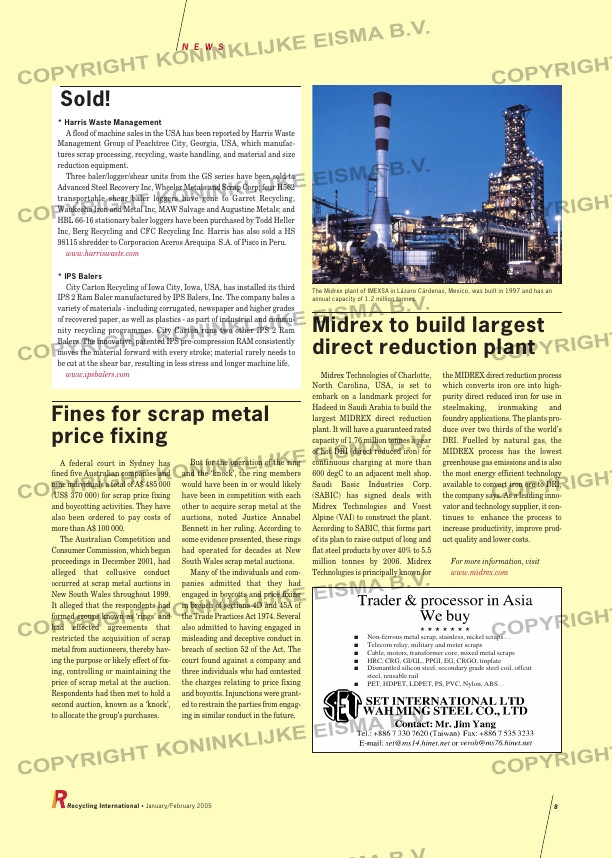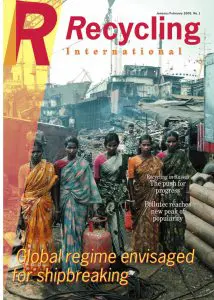Page 8 from: January / February 2005

N E W S
Midrex Technologies of Charlotte,
North Carolina, USA, is set to
embark on a landmark project for
Hadeed in Saudi Arabia to build the
largest MIDREX direct reduction
plant. It will have a guaranteed rated
capacity of 1.76 million tonnes a year
of hot DRI (direct reduced iron) for
continuous charging at more than
600 degC to an adjacent melt shop.
Saudi Basic Industries Corp.
(SABIC) has signed deals with
Midrex Technologies and Voest
Alpine (VAI) to construct the plant.
According to SABIC, this forms part
of its plan to raise output of long and
flat steel products by over 40% to 5.5
million tonnes by 2006. Midrex
Technologies is principally known for
Recycling International • January/February 2005 8
■ Non-ferrous metal scrap, stainless, nickel scraps…
■ Telecom relay, military and meter scraps
■ Cable, motors, transformer core, mixed metal scraps
■ HRC, CRG, GI/GL, PPGI, EG, CRGO, tinplate
■ Dismantled silicon steel, secondary grade steel coil, offcut
steel, reusable rail
■ PET, HDPET, LDPET, PS, PVC, Nylon, ABS…
the MIDREX direct reduction process
which converts iron ore into high-
purity direct reduced iron for use in
steelmaking, ironmaking and
foundry applications. The plants pro-
duce over two thirds of the world’s
DRI. Fuelled by natural gas, the
MIDREX process has the lowest
greenhouse gas emissions and is also
the most energy efficient technology
available to convert iron ore to DRI,
the company says. As a leading inno-
vator and technology supplier, it con-
tinues to enhance the process to
increase productivity, improve prod-
uct quality and lower costs.
For more information, visit
www.midrex.com
The Midrex plant of IMEXSA in Lázaro Cárdenas, Mexico, was built in 1997 and has an
annual capacity of 1.2 million tonnes.
Midrex to build largest
direct reduction plant
* Harris Waste Management
A flood of machine sales in the USA has been reported by Harris Waste
Management Group of Peachtree City, Georgia, USA, which manufac-
tures scrap processing, recycling, waste handling, and material and size
reduction equipment.
Three baler/logger/shear units from the GS series have been sold to
Advanced Steel Recovery Inc, Wheeler Metals and Scrap Corp; four H562
transportable shear baler loggers have gone to Garret Recycling,
Waukesha Iron and Metal Inc, MAW Salvage and Augustine Metals; and
HBL 66-16 stationary baler loggers have been purchased by Todd Heller
Inc, Berg Recycling and CFC Recycling Inc. Harris has also sold a HS
98115 shredder to Corporacion Aceros Arequipa S.A. of Pisco in Peru.
www.harriswaste.com
* IPS Balers
City Carton Recycling of Iowa City, Iowa, USA, has installed its third
IPS 2 Ram Baler manufactured by IPS Balers, Inc. The company bales a
variety of materials – including corrugated, newspaper and higher grades
of recovered paper, as well as plastics – as part of industrial and commu-
nity recycling programmes. City Carton runs two other IPS 2 Ram
Balers. The innovative, patented IPS pre-compression RAM consistently
moves the material forward with every stroke; material rarely needs to
be cut at the shear bar, resulting in less stress and longer machine life.
www.ipsbalers.com
Sold!
A federal court in Sydney has
fined five Australian companies and
nine individuals a total of A$ 485 000
(US$ 370 000) for scrap price fixing
and boycotting activities. They have
also been ordered to pay costs of
more than A$ 100 000.
The Australian Competition and
Consumer Commission, which began
proceedings in December 2001, had
alleged that collusive conduct
occurred at scrap metal auctions in
New South Wales throughout 1999.
It alleged that the respondents had
formed groups known as ‘rings’ and
had effected agreements that
restricted the acquisition of scrap
metal from auctioneers, thereby hav-
ing the purpose or likely effect of fix-
ing, controlling or maintaining the
price of scrap metal at the auction.
Respondents had then met to hold a
second auction, known as a ‘knock’,
to allocate the group’s purchases.
But for the operation of the ring
and the ‘knock’, the ring members
would have been in or would likely
have been in competition with each
other to acquire scrap metal at the
auctions, noted Justice Annabel
Bennett in her ruling. According to
some evidence presented, these rings
had operated for decades at New
South Wales scrap metal auctions.
Many of the individuals and com-
panies admitted that they had
engaged in boycotts and price fixing
in breach of sections 4D and 45A of
the Trade Practices Act 1974. Several
also admitted to having engaged in
misleading and deceptive conduct in
breach of section 52 of the Act. The
court found against a company and
three individuals who had contested
the charges relating to price fixing
and boycotts. Injunctions were grant-
ed to restrain the parties from engag-
ing in similar conduct in the future.
Fines for scrap metal
price fixing



